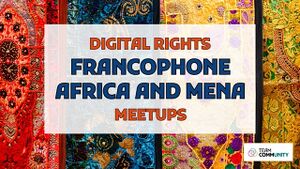Julliet 17 2024, Digital Rights in Francophone Africa and MENA Meetup
Les Droits numériques en Afrique & MENA francophones rendez-vous bimestriel sont des moments conviviaux qui réunissent des membres francophones de notre communauté issus d’Afrique et du Moyen-Orient. On s'y retrouve pour échanger, s'entraider et décompresser ensemble. C'est aussi l'occasion de partager nos travaux et de rester informés sur ce qui se passe dans les régions francophones. Si vous ne pouvez pas participer aux réunions bimensuelles, ne vous inquiétez pas, nous prenons des notes à chaque rencontre, que vous pouvez consulter ci-dessous.
Le reste du temps, la communauté francophone reste connectée via le canal des Libertés numériques en Afrique francophone, Moyen-Orient et Afrique du Nord sur le Mattermost de TCU et participe à divers événements organisés tout au long de l'année sur des sujets variés.
| Francophone Africa and MENA Meetup |
- Date: Mercredi, 17 Julliet 2024
- Heure: 13h UTC / 9am EDT (Quelle heure est-il dans ma ville?)
- Host: Brahem
- Lieu: Le lien sera partagé dans le canal Libertés numériques en Afrique francophone, Moyen-Orient et Afrique du Nord sur le Mattermost de TCU une ou deux heures avant le début de la réunion.
- Vous n'avez pas de compte sur TCU Mattermost? Aucun souci, suivez les instructions ici pour en obtenir un.
Notes collectives: N'hésitez pas à les ajouter ici: https://pad.riseup.net/p/TCU_francophone_meetups
Notes
Attendees: 2
Community Check-in:
1. Elections in the region with lots of internet shut down
2. Recent developments in Tunisia, the violation of digital rights have gotten more brutal, and people are being sentenced to jail when they post critical stuff about the presidents. There have been propaganda campaigns on tiktok. Politcal fiqures who have expressed interest in running for the elections are arrested or disqualified in abitrary ways.
3. CSOs are actively been targetted, offices, devices searched, fears of arrests. Theres punishment of any form of solidarity for asylum seekers or immigrants coming from any other African countries. Theres a rise in fascism, and support for racist hate speech and disinformation about immigrants. They have been leaving the last days of freedoms, and NGOs are actively trying to protect themselves.
4. Physical spaces are no longer safe
Had more conversations on how the community is doing and personally navigating some of this unpredictability.
Gaps in both regions:
1. In Tunisia, theres a lack of core funding for holistic security projects and making sure that the interventions are not limited in time, and do not result in efficient of actual change in the behaviours, policies and protectic
2. In the context of an emergency, when there is a stronger wave of crack down, there is more to be done when it comes to communication between human rights groups in the continent to help each other with knowledge sharing. In Tunisia, CSOs was only created after 2011, post Arab Spring, where the threat model and risk profile was much different from what they are dealing with recently and the current regimes. And all groups here could benefit from learning from other African countries operating under repressive regimes, and places with more solid digital rights work. Improving the tool box to address the issues
3. Increased talent and skills Spyware and malware detection, and mobile forensics is needed more than ever now.
4. The lack of knowledge: The issue of surveillance and security isnt vary known publicly in Ivory Coast. The issue of digital rights is also complicated, people dont think they can be subjected to digital attacks
5. The lack of organizations working in digital rights (West Africa)
6. When you know the local context and you start fighting against some of the things the government is trying to implement complicates issues. Because you become a target, and because there are so few orgs doing the work its very easy to target you. It is hard to ask for local support.
7. Regional context: In Mauritania, Burkina Faso and Mali has been facing shutdowns during elections. So trying to explore ways to improve anti-surveillance, and anti-censorship work in the region without having to rely on local support is one of the key queastions.
